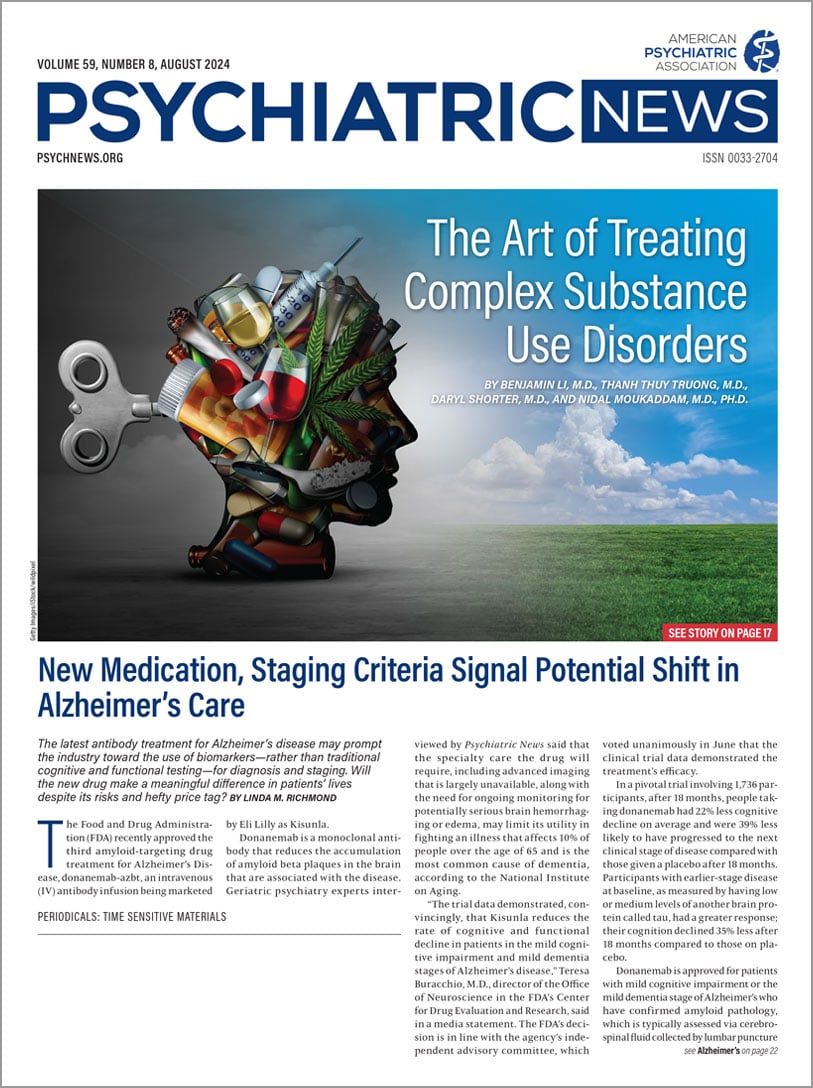Treating people with long-haul COVID-19 in an outpatient setting involves taking a comprehensive, multidisciplinary quality-of-life approach, according to two experts in the condition who spoke at this year’s Annual Meeting.
“It’s essential for psychiatrists to become more comfortable in the evaluation and treatment of the neuropsychiatric sequelae of this illness,” explained Thida Myo Thant, M.D., member of APA’s Council on Consultation-Liaison Psychiatry and director of the Consultation-Liaison Psychiatry Service at the University of Colorado’s Anschutz Medical Campus. While patients can reach remission, it is not a quick fix, she said.
“Psychiatrists are uniquely well suited to provide the type of supportive and targeted treatment of the types of symptoms these patients are experiencing,” added Thant, who is also a co-author of the
APA resource document on treating patients with long-COVID issued earlier this year. Patients are often sent to many other specialists and experience medical trauma before they finally arrive at the long-haul COVID mental health program she heads.
Worldwide, an estimated 10% of people infected with COVID-19, representing 65 million people, develop long-haul symptoms, with rates five to eight times higher among those who were hospitalized for the infection, explained Abhisek Khandai, M.D., an assistant professor of psychiatry at UT Southwestern Medical Center. Those who were in the intensive care unit and experienced encephalopathy are at the highest risk, he added.
The most common symptoms are fatigue, headache, and neurocognitive deficits, such as attention-deficit problems. The development of neurocognitive and psychiatric illness is most likely within the first six months following acute COVID-19 illness, but risks stay elevated for as long as two years. Pre-existing conditions that leave patients at higher risk include prior psychiatric, hypertensive or chronic pulmonary disorders, or diabetes and other chronic illnesses. As for demographic factors, older patients, women, and people with higher body mass index are at increased risk.
“There are also racial disparities in the diagnosis and treatment of the disorder, with Blacks and Latinos having high incidence of symptoms, but they just aren’t getting diagnosed or receiving care,” Khandai said.
Thant explained that neuro- and systemic inflammatory processes similar to those caused by other viruses are believed to play a key role. “Even those patients who don’t become very ill with COVID-19 infection may show some changes on brain imaging and cognitive tests.”
Thant gave the following pointers for managing patients with long-haul COVID:
•
Use formal screening: “Start by screening things you already know how to screen,” she said. She utilizes various validated screening tools that objectively assess baseline depression, anxiety, trauma, fatigue, cognitive symptoms, sleep disorders, and quality of life. Thant finds that the Hospital and Anxiety Depression Scale provides a clearer view of patients’ mood than the PHQ-9. That’s because patients who are dealing with a new chronic illness tend to score overly high on the PHQ-9 due to the associated anhedonia. “What you’ll find is that long COVID patients don’t necessarily meet the cutoffs on many screening tools, but they may still be troubled enough by their symptoms to warrant treatment,” she said.
•
Other screening to consider: Neurological examinations are valuable to rule out focal deficits, and Thant considers ordering neuroimaging when focal deficits or cognitive symptoms are present.
•
Address polypharmacy: Oftentimes, patients are already taking a slew of medications and supplements by the time they arrive at the long-haul COVID clinic. Thant starts by culling patients’ prescription lists of duplicative or likely to be unhelpful treatments. For patients with fatigue, brain fog, and/or neurocognitive deficits, it is important to cease or limit the use of antihistamine or anticholinergic medications, as well as benzodiazepines, she added.
•
Re-establish lifestyle factors: Patients with long-haul COVID often feel so ill that they stop pro-healthy habits in which they were engaging prior to contracting the infection, such as eating healthfully or working out.
•
Assess insomnia and sleep problems: “If you’re not sleeping well, your memory is not going to be as good, and if you’re not sleeping well for months on end, you’re really not going to feel well,” Thant said. She uses validated screening tools to assess her patients’ sleep. First, she rules out contributing mood, anxiety, or trauma disorders as the etiology. She also counsels them on basic sleep hygiene, such as avoiding caffeine, engaging in relaxation, limiting screentime and liquid intake a few hours before bedtime, and maintaining a consistent sleep/wake schedule. To address sleep problems, she advises sleep restriction, mindfulness exercises, melatonin, and CBT-i for insomnia.
•
Take it slow: Patients who are just starting to feel better may rebound if they push too quickly to return to previous levels of functioning. “Then they come back feeling really distressed and depressed because all their symptoms flared again,” she said. “The challenging thing about long COVID is that the symptoms can wax and wane. Like many other chronic illnesses, you can be doing well until you’re not. Thant advises creating a structured return-to-activity program, including easing back to cognitive work. For example, instead of going on a five-mile hike, she encourages patients to take a walk around the block and see how they feel the next day. The idea is to build up activity levels in increments of 10% over a structured timeframe, she said. ■
